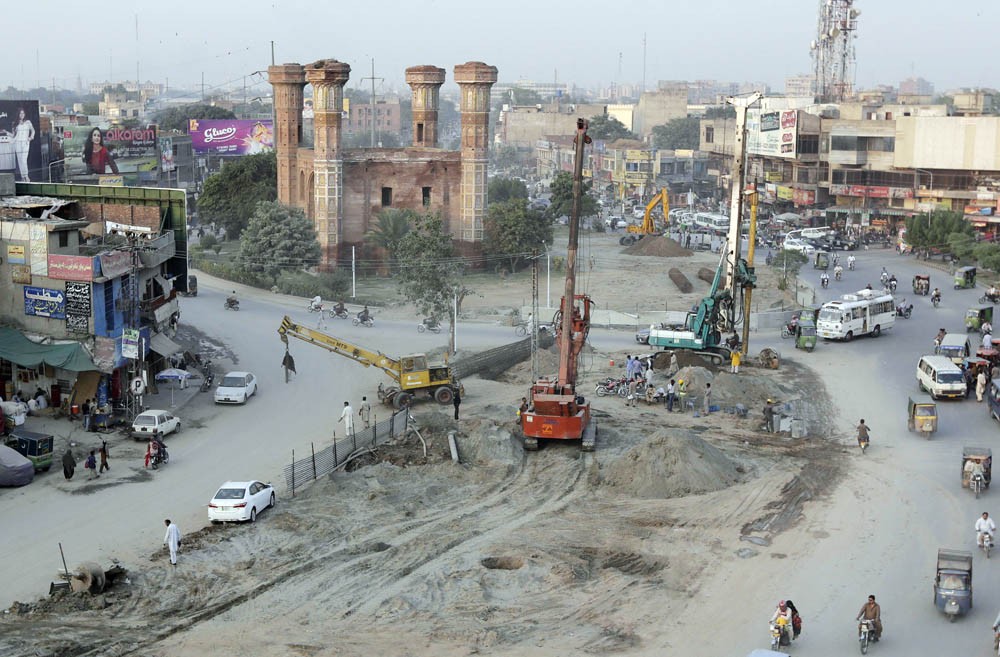
With little headway on the political front, the fate of Orange Metro now rests on cases being fought in the court of law

For a layperson, it is hard to comprehend legal complexities. It was thus quite shocking for some concerned citizens who took a long list of grievances against the Orange Metro to some of the best legal minds of Lahore to find that there was no legal case. The lawyers told them the grievances were primarily related to policy while they had to instead convince the court that certain laws were broken. Additionally, given the experience of the Signal Free case, they thought that one could only delay the project rather than stop it altogether. Other than a few lawyers who took the plunge managing to get stay order on 11 heritage sites, the majority asked them to opt for political mobilisation.
As tens of disparate protests continued across the 27-km route, and independent activists brought together the affected communities and active citizenry for a charged protest in January, the issue was picked up by the mainstream electronic media. The opposition political parties held a combined protest against the Orange Metro in early February.
However, this political momentum was lost because of two factors: one, the opposition political parties, while raising the issue in Punjab Assembly, did not do any grassroots mobilisation leaving the vulnerable communities at the mercy of the government; two, the government went into full gear practically buying off a few self-subscribed community leaders through the PML-N local network, raised the general compensation amount, or else used the stick with LDA and police officials arriving with bulldozers to demolish houses with families inside -- the case of Bengali Building where Rs10 lakh was given per family/quarter is a case in point.
For those of us trying to understand this madness in the seat of power and privilege that is Takht Lahore, it is clear that this can only happen if there exists not a single political party with roots among people. This was an ideal opportunity for any opposition party to make inroads into the PML-N Lahore constituency. With such a scale of human displacement especially in the 7-km Chauburji to G.T. Road section which was originally conceived as a tunnel, and the ongoing land acquisition and income loss of traders along the Multan-McLeod-Nicolson-G.T. Road route because of badly planned and rushed construction, Lahore has been searching in vain for political leadership that could become the voice of the affected communities.
Political leaders with Lahori roots have yet to take the 27-km route even once to meet the affected citizens whose number would run over a million (as stated in the 2007 feasibility of Orange Line).
The 40-55 per cent usual election voter turnout in Pakistan, minimal membership of political parties, and almost non-existent active (day-to-day) participation of members is thus no surprise. The hypothetical, conceptual mantras of a jalsa do have an appeal, but they matter little in the making of an active political worker who can lead the community in its time of need, and thus demand their vote at the time of elections. Without a concrete change in this current mode of politics, these parties do not have the clout to take on the entrenched power of the PML-N in Punjab. Its successful patronage-based model, which encourages the upwardly mobile moneyed actor to join it for access to state machinery and resources, can only be countered with active grassroots political involvement.
So, with little headway on the political front, the fate of Orange Metro now rests on cases being fought in the court of law. However, contrary to what the lawyers had initially thought, the government’s own negligence in rushing through the project has strengthened the case. The petitioner lawyers have argued on three fronts: Due Process, Environment and Heritage.
The argument is that the government did not follow the Punjab Procurement Regulatory Authority Act 2009, when it gave contracts to LDA, Nespak and the Chinese firm CR-Norinco. Further, it started work on the project without getting the No Objection Certificates (NOC) from concerned departments such as the Environment Protection Agency (EPA) and the Archeology Department, thus breaking The Antiquities Act 1992 and The Punjab Special Premises Ordinance 1985.